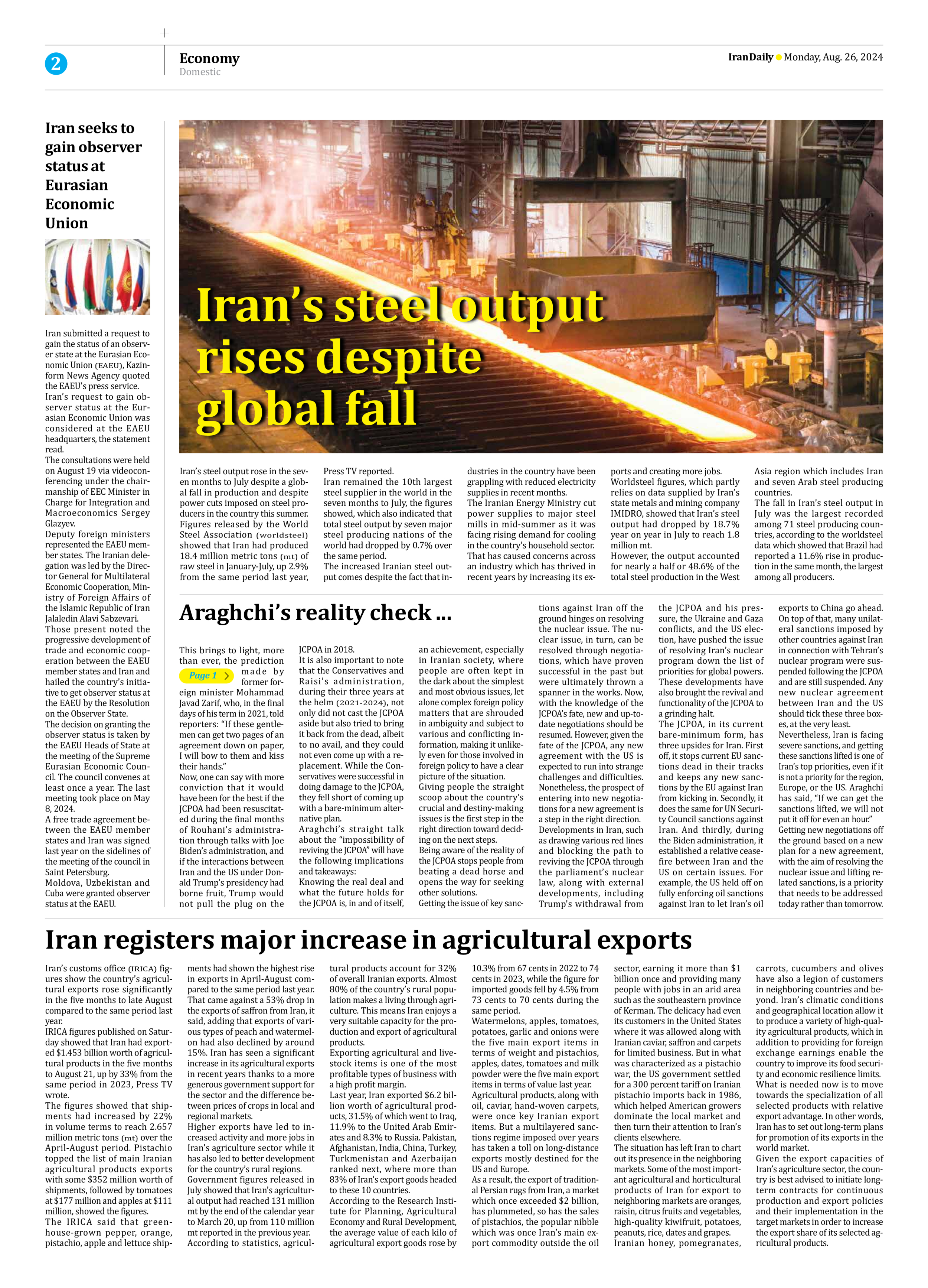
Araghchi’s reality check ...
Page 1
This brings to light, more than ever, the prediction made by former foreign minister Mohammad Javad Zarif, who, in the final days of his term in 2021, told reporters: “If these gentlemen can get two pages of an agreement down on paper, I will bow to them and kiss their hands.”
Now, one can say with more conviction that it would have been for the best if the JCPOA had been resuscitated during the final months of Rouhani’s administration through talks with Joe Biden’s administration, and if the interactions between Iran and the US under Donald Trump’s presidency had borne fruit, Trump would not pull the plug on the JCPOA in 2018.
It is also important to note that the Conservatives and Raisi’s administration, during their three years at the helm (2021-2024), not only did not cast the JCPOA aside but also tried to bring it back from the dead, albeit to no avail, and they could not even come up with a replacement. While the Conservatives were successful in doing damage to the JCPOA, they fell short of coming up with a bare-minimum alternative plan.
Araghchi’s straight talk about the “impossibility of reviving the JCPOA” will have the following implications and takeaways:
Knowing the real deal and what the future holds for the JCPOA is, in and of itself, an achievement, especially in Iranian society, where people are often kept in the dark about the simplest and most obvious issues, let alone complex foreign policy matters that are shrouded in ambiguity and subject to various and conflicting information, making it unlikely even for those involved in foreign policy to have a clear picture of the situation.
Giving people the straight scoop about the country’s crucial and destiny-making issues is the first step in the right direction toward deciding on the next steps.
Being aware of the reality of the JCPOA stops people from beating a dead horse and opens the way for seeking other solutions.
Getting the issue of key sanctions against Iran off the ground hinges on resolving the nuclear issue. The nuclear issue, in turn, can be resolved through negotiations, which have proven successful in the past but were ultimately thrown a spanner in the works. Now, with the knowledge of the JCPOA’s fate, new and up-to-date negotiations should be resumed. However, given the fate of the JCPOA, any new agreement with the US is expected to run into strange challenges and difficulties. Nonetheless, the prospect of entering into new negotiations for a new agreement is a step in the right direction.
Developments in Iran, such as drawing various red lines and blocking the path to reviving the JCPOA through the parliament’s nuclear law, along with external developments, including Trump’s withdrawal from the JCPOA and his pressure, the Ukraine and Gaza conflicts, and the US election, have pushed the issue of resolving Iran’s nuclear program down the list of priorities for global powers. These developments have also brought the revival and functionality of the JCPOA to a grinding halt.
The JCPOA, in its current bare-minimum form, has three upsides for Iran. First off, it stops current EU sanctions dead in their tracks and keeps any new sanctions by the EU against Iran from kicking in. Secondly, it does the same for UN Security Council sanctions against Iran. And thirdly, during the Biden administration, it established a relative cease-fire between Iran and the US on certain issues. For example, the US held off on fully enforcing oil sanctions against Iran to let Iran’s oil exports to China go ahead. On top of that, many unilateral sanctions imposed by other countries against Iran in connection with Tehran’s nuclear program were suspended following the JCPOA and are still suspended. Any new nuclear agreement between Iran and the US should tick these three boxes, at the very least.
Nevertheless, Iran is facing severe sanctions, and getting these sanctions lifted is one of Iran’s top priorities, even if it is not a priority for the region, Europe, or the US. Araghchi has said, “If we can get the sanctions lifted, we will not put it off for even an hour.”
Getting new negotiations off the ground based on a new plan for a new agreement, with the aim of resolving the nuclear issue and lifting related sanctions, is a priority that needs to be addressed today rather than tomorrow.







